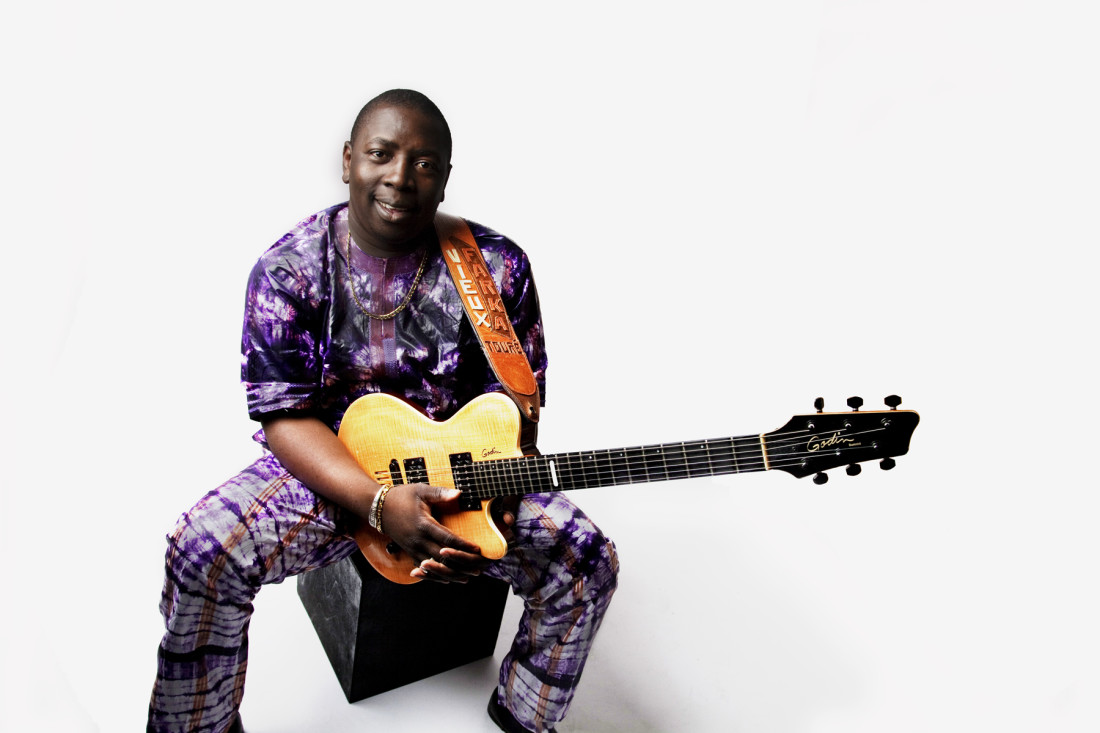Vieux Farka Touré is the guitar-playing and singing son of the late Ali Farka Touré, the Malian musician responsible for helping to bridge the gap between traditional West African music and the blues. But from the very beginning of his own musical career, Vieux has charted his own musical path. He’s a popular draw locally; in recent years he’s played LEAF and Goombay, and has headlined The Orange Peel and New Mountain as well. Touré takes the stage at The Mothlight on Thursday, April 13.
The elder Touré never wanted his son to become a musician; he wanted an easier life for Vieux. Bowing somewhat to his father’s wishes, Vieux did not begin his recording career until after the 2006 death of Ali. And though he has been touring and recording for a decade now, Vieux still recognizes the responsibility that comes with his famous moniker. The Touré name “is a large part of my professional identity,” he admits, “whether or not I chose to embrace this. While there is a lot of pressure to walk in his footsteps, I am very proud to have this responsibility. It is an honor for me to continue his legacy.”
But Vieux doesn’t mimic his father’s musical approach. One listen to “Homafu Wawa,” the opening track on Samba, his seventh and latest album, demonstrates that vividly. The guitar textures on the tune owe at least as much to indie-rock as to African musical traditions.
“I do not need to be exactly as Ali was and do exactly what he did,” Vieux says, “but rather operate in the same spirit of honoring our culture while also growing the tradition to include different styles and ideas.” He says that as he grew up (Vieux was born in 1981) he absorbed the influences of Western pop and rock music. “For an artist to be honest, he must make art that comes naturally,” Touré says. “And for me, what comes naturally is a mix of traditional music and modern music.”
Keen listeners will discover just how successfully Vieux creates that mix. “Homafu Wawa” has a strong central melody of its own but also incorporates a melodic line from the reggae and rock classic “I Shot the Sheriff.” “Yes, of course,” Vieux admits. “This is a small homage to the king, the great Bob Marley. He is a big inspiration for me and for the people of Mali in general.”
Vieux arrives at his mix of styles effortlessly. “Honest art does not calculate which influences to use and which ones not to use,” he says.
Beyond the debt Vieux owes to the legacy of his father, he accepts accountability as well toward those who listen to his music. “My responsibility is to put my heart and soul into the album, to make it as strong and pure as I can,” he says. “The responsibility I have to my fans is the same one that I have to myself. I must simply put forth the best effort that I can and try to express what is inside of me as directly as possible through my music.”
The album title Samba has nothing to do with the same-named Brazilian style of music, though the latter does, in fact, have roots in West African tradition. “In my language, the Sonrai language, ‘samba’ means ‘second-born,’” Touré explains. “This is me in Ali’s family.”
The song “Samba Si Kairi” is the album’s centerpiece. “This song talks about my childhood, my parents,” Touré says. “My grandfather would sing ‘Samba Si Kairi’ to me as a child, and I would dance. Samba, who never breaks, who never runs from threats, who is not afraid. This song is an homage to my grandparents.”
Samba was cut live in the studio, with an audience present. And each of the album’s 10 songs was performed and recorded only once, capturing and preserving a sense of spontaneity. The inspiration for that approach comes from a quality source. “James Brown once said, ‘The first take is God, the second take is man,’” Touré says. “And I agree with the great Godfather of Soul.”
WHO: Vieux Farka Touré with Last Good Tooth
WHERE: The Mothlight, 701 Haywood Road, themothlight.com
WHEN: Thursday, April 13, 9 p.m. $15 advance/$10 day of show




Before you comment
The comments section is here to provide a platform for civil dialogue on the issues we face together as a local community. Xpress is committed to offering this platform for all voices, but when the tone of the discussion gets nasty or strays off topic, we believe many people choose not to participate. Xpress editors are determined to moderate comments to ensure a constructive interchange is maintained. All comments judged not to be in keeping with the spirit of civil discourse will be removed and repeat violators will be banned. See here for our terms of service. Thank you for being part of this effort to promote respectful discussion.